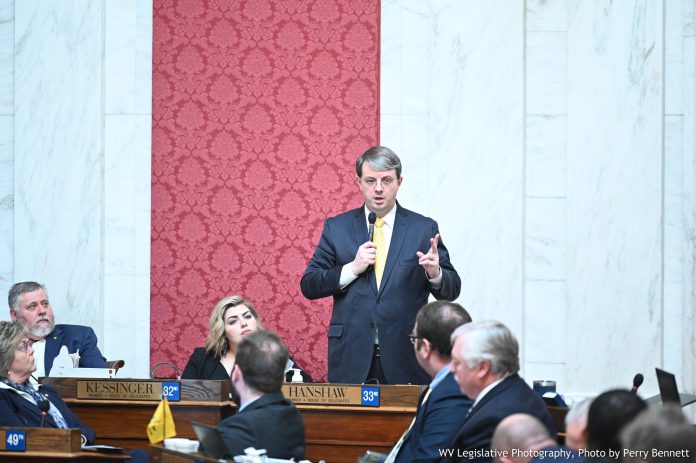The 2nd Session of the 85th Legislature concluded on March 12, 2022.
Here’s a glimpse of the 60-day session:
- 150 House Bills Completed
- 134 Senate Bills Completed
- 293 Total Bills
- 172 Resolutions Adopted by both the Senate and House
- 280 Bills signed by Governor
- 6 Bills became law without signature
- 5 bills have been vetoed: SB 573, SB 729, HB 2300, HB 4001, and HB 4020
For a PDF List of Completed bills, please see: 2022 Legislative Session At A Glance.
Highlighted Bills
House Bill 4020 reorganizes the DHHR into two separate departments, the Department of Health, and the Department of Human Resources. The bill set the organizational structure of each department. The two secretaries of the new agencies would be in place by January 2023 with the new agencies being effective in July 2023. The new organizational charts shall be available by February 2023.
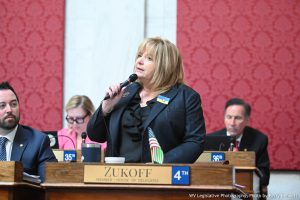 The following agencies and boards shall be a part of the Department of Human Resources: Bureau of Social Services, Bureau of Medical Services, Bureau for Child Support Enforcement, Bureau of Family Assistance, Bureau of Behavior Health, Office of Drug Control Policy, and Office of Maternal Child and Family Health.
The following agencies and boards shall be a part of the Department of Human Resources: Bureau of Social Services, Bureau of Medical Services, Bureau for Child Support Enforcement, Bureau of Family Assistance, Bureau of Behavior Health, Office of Drug Control Policy, and Office of Maternal Child and Family Health.
The following agencies and boards shall be a part of the Department of Health: Bureau for Public Health, Office of Emergency Medical Services and the Emergency Medical Service Advisory Council, Office of the Chief Medical Examiner, Bureau for Health Facilities, Bureau of the Inspector General, Office of Health Facility Licensure and Certification, and Health Care Authority.
Any other bureau, office, board, commission, or entity not specified in the code shall be placed in the organizational chart based on the two secretaries’ decision.
The bipartisan bill went through the House and Senate Finance Committees and was amended several times before completing the legislative process on March 13, 2022. The bill was vetoed by the Governor.
House Bill 4492 merges the Public Port Authority, the WV State Rail Authority, the Division of Public Transit, and the WV State Aeronautics Commission into the West Virginia Division of Multimodal Transportation as of July 1, 2022. The division will administer all federal and state programs related to public ports, railroad transportation and commerce, public transit, aeronautics, airports, and air navigation facilities in the state.
The Secretary of the DOT or designee will be the chief operating officer of the division. The Secretary will coordinate with the Secretary of the Department of Economic Development to facilitate economic development utilizing transportation facilities.
All employees, vehicles, real property interests, equipment contracts/agreements, interests under any existing insurance policy, and records belonging to the above agencies will be transferred to the West Virginia Division of Multimodal Transportation Facilities. The Department of Transportation is tasked with providing appropriate office locations to fulfill the functions of this division.
Each year, the Division of Multimodal Transportation will be required to submit a report to the Governor by June 30. These reports are not required to be submitted to the Legislature unless requested by a member or committee. By December 31 of each year, the agency shall report to the Legislature the status of projects, operations, financial conditions, and other necessary information. All reports shall be submitted electronically unless a paper copy is requested.
The purpose of this agency is to provide and support safe and efficient transportation throughout the state, preserve roadway, railroad, waterway, and airway facilities, and help facilitate economic development utilizing transportation facilities. The agency shall also meet and cooperate with similar divisions in other states, enter contacts with public and private entities to perform duties, and purchase, lease, and sell, property, equipment, etc. as needed to perform functions.
Current rules of the separate divisions shall continue once the Division of Multimodal Transportation is created and shall remain in effect until revised or repealed by the division. The division, upon consultation with the Secretary of the DOT, shall make rules for the agency.
House Bill 4559 provides for the final disposition of unidentified and unclaimed remains in the possession of the Office of the Chief Medical Examiner. The bill states unclaimed remains shall be cremated, and unidentified remains shall be buried. The bill also allows the Examiner to locate lands suitable for cemetery use. The unidentified remains shall be buried after six months of trying to identify the person and his or her next of kin. In the event the death is the result of a crime, all physical evidence shall be collected before burial. Identified but unclaimed remains shall be cremated 30 days after a person has passed and after efforts to contact next of kin have been exhausted.
Once a decedent is identified as next of kin, a medical examiner may have the body removed from the cemetery with proper documentation. No person may file any cause of action against the Office of the Medical Examiner or medical examiner acting in the capacity of a medical examiner.
It gives the chief medical examiner the authority to release records and information to other state agencies when necessary. The bill also removes “be of good moral character” from the code. This is taking place in several sections of code as it is arbitrary.
This bill came about after a legislative audit of the Office of the Chief Medical Examiner found that there were 248 unidentified and unclaimed decedents in frozen storage or cremated remains dating back to the 1970s. Sixteen of the 248 were stored before the 2000s. This bill allows the Chief Medical Examiner to reduce the storage burden on the office.
Completed Bills
House Bill 2096 reinstates the film tax credit. The management and coordination of the film tax credit will be by the WV Office of Economic Development. The department must create a database of locations, music, and other resources to be made available to film production teams. Only certain projects qualify for the tax credit, commercials and promotional videos are not included.
House Bill 2177 authorizes the DMV to issue ID cards without photographs for children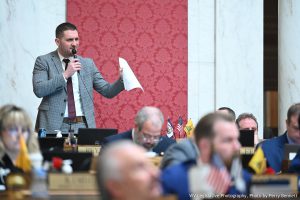 under 16.
under 16.
House Bill 2300 adds family court judges to the definition of “judges” and includes them in the Judges’ Retirement System.
House Bill 2325 removes the requirement of continuing education for barbers and cosmetologists.
House Bill 2631 allows DNR Officers to contract to work for a private person or entity during off-duty hours if the work does not violate the DNR Law Enforcement Section rules as to location or nature.
House Bill 2733 establishes a Combat Action Badge and Combat Action Ribbon special license plates.
House Bill 2817 creates the Donated Drug Repository Program and authorizes the WV Board of Pharmacy to administer the program.
House Bill 2838 creates the state suitor’s public integrity and fraud fund for restitution payments reimbursements of incurred costs due to misuse of public funds.
House Bill 2910 requires the Supreme Court of Appeals to conduct or arrange for a caseload study of the state’s magistrate courts. The Court must contain its recommendations to 170 or fewer magistrates state-wide. The recommendations must be submitted by January 5, 2023.
House Bill 3073 establishes the West Virginia Emergency School Food Act. The bill allows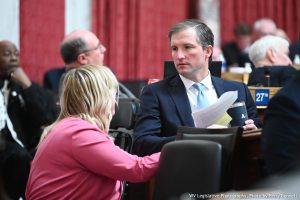 for an annual countywide survey of public-school students to determine certain eating patterns and the availability of nutritious foods to certain students when schools are closed. The county board may implement any program to help students. The West Virginia Office of Child Nutrition shall receive reports and may monitor programs.
for an annual countywide survey of public-school students to determine certain eating patterns and the availability of nutritious foods to certain students when schools are closed. The county board may implement any program to help students. The West Virginia Office of Child Nutrition shall receive reports and may monitor programs.
House Bill 3082 allows the WV DEP Division of Air Quality to invest the money in the Air Pollution Control Fund and the Air Pollution Education and Environment Fund to receive interest on the funds held in those accounts to offset decreasing permit fee collections and to preserve funding for the Division.
House Bill 3220 requires additional information disclosure of taxpayer funding lobbyists.
House Bill 3223 prohibits the dedication or naming of any state, county, or municipal building or public structure for a public official who is holding office at the time of the proposed dedication or naming.
House Bill 3231 prohibits the charging of interest on security deposits held for up to eighteen months by public utility companies.
House Bill 3303 clarifies that a county executive committee fills the vacancy on the primary election ballot of an intra-county delegate or senatorial race. The bill prohibits the Secretary of State from refusing certification of candidates appointed by the county executive for that district by the deadline for placement.
House Bill 3312 establishes a monument to child labor and child workers who died in the course of employment in the state.
House Bill 4001 creates a process for mapping disturbances in rights of way and utility rights of way and easement. The bill creates existing customer protection for the Office of Attorney General in coordination with the Office of Broadband and Department of Economic Development. The bill provides for competitive access infrastructure.
House Bill 4002 creates the Certified Sites and Development Readiness Program under the Department of Economic Development. The Department is required to establish evaluation criteria and site certification levels. It will create an application process and determine eligible applicants. There are two grant programs established in the bill: a matching grant of up to 50 percent and a micro-grant of up to $25,000.
House Bill 4003 establishes a clear legal right of the title of chemical compounds, elements, and substances derived from the treatment of acid mine drainage. The bill states mine drainage water treatment is necessary to reduce environmental harm. The bill clarifies that the entity treating the drainage has rights to the material.
House Bill 4008 directs the Higher Education Policy Commission to work with the WV Council for Community and Technical College Education to create a funding formula model governing its appropriation request to the legislature.
House Bill 4012 prohibits any state or local government office, department, agency, higher education institution, or hospital from requiring proof of COVID-19 vaccination as a condition of entry.
House Bill 4019 creates deadlines for public charter school contract execution and student enrollment application, lottery, and enrollment for schools intending to open in the school year beginning July 1, 2022.
House Bill 4021 amends the Medical Student Loan Program. The bill authorizes medical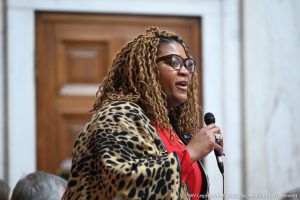 schools to make loans, by using a special revolving fund for the program. Eligibility requirements and maximum loan amounts are established. Students are required to do the following: complete the required course of instruction and received a doctorate of medicine or a doctorate of osteopathy, apply and obtain a license to practice medicine in WV, engage in the full-time practice of medicine for 12 months within an approved service commitment area, commence the full-time practice of medicine within nine months of completing a post-graduate residency training program and licensure in the approved service area and continue working in an approved area for a consecutive period of months equal to the total number of months for which the medical student loan was provided, and maintain records and make reports to the issuing medical school.
schools to make loans, by using a special revolving fund for the program. Eligibility requirements and maximum loan amounts are established. Students are required to do the following: complete the required course of instruction and received a doctorate of medicine or a doctorate of osteopathy, apply and obtain a license to practice medicine in WV, engage in the full-time practice of medicine for 12 months within an approved service commitment area, commence the full-time practice of medicine within nine months of completing a post-graduate residency training program and licensure in the approved service area and continue working in an approved area for a consecutive period of months equal to the total number of months for which the medical student loan was provided, and maintain records and make reports to the issuing medical school.
House Bill 4024 seeks to create a cosmetology apprentice program that allows companies to train employees for practical real-world experience.
House Bill 4048 clarifies that individuals may possess loaded rifles and shotguns in their vehicles if they are not there for the purpose to take wildlife.
House Bill 4050 defines livestock in the General Stock Law, which involves livestock trespassing on the property of another.
House Bill 4059 clarifies that all newly hired deputy commissioners within DHHR are in policy-making positions exempt from civil service.
House Bill 4060 removes outdated health code sections relating to Coalition for Diabetes Management, Coalition for Responsible Pain Management, and State Advisory Coalition on Palliative Care.
House Bill 4062 removes the residency requirement for the Commissioner of the Division of Highways. This commissioner is the only one currently required to reside in the “state capital.”
House Bill 4065 requires hunter safety programs to be offered once every spring semester at every public middle school in the state. The bill adds the option for the middle schools during the fall semester if there is a demand. The program may be an option for public high schools where demand is sufficient, and instructors are available.
House Bill 4067 makes agency reports electronic for some agencies rather than in paper form. The electronic report shall be posted on the legislative website. Paper copies may be provided upon request. It also eliminates reporting for some agencies.
House Bill 4074, Meghan’s Law, requires the state BOE to establish training requirements for all public-school employees on students’ self-harm behaviors and eating disorders. The bill requires yearly education for middle and high school students regarding self-harm behavior and eating disorder signs, prevention, and treatment. The bill passed unanimously in the House and moved to the Senate.
House Bill 4084 amends the Solid Waste Management Act by adding advanced recycling, which allows it to happen in the state.
House Bill 4097 prohibits nonpublic funding sources for election administration. A separate special revenue fund will be created through the Treasury to keep the moneys separate from public moneys. The account shall be known as the Nonpublic funding for Election Administration Funding.
House Bill 4098 clarifies matters relating to geothermal energy. The bill applies to geothermal resources at temperatures above the minimum temperature and the minimum volumetric flow rates set forth by the DEP.
House Bill 4110 states that a county board of education serving as a fiscal agent for a multi-county vocational center may not be penalized for the county’s failure to meet the minimum ratio if the failure is due to the staffing levels at the multi-county vocational center.
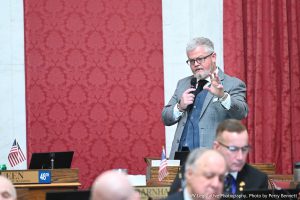 House Bill 4112 provides consumers with a choice of pharmacy services. The bill limits the ability of pharmacy benefit managers to restrict consumer access to pharmacies through the designation of “specialty drugs.” The bill also restricts the ability of pharmacy benefit managers to exclude a pharmacy or pharmacist from network participation through restrictive licensing requirements or change the terms of participating pharmacy contracts without adequate notice.
House Bill 4112 provides consumers with a choice of pharmacy services. The bill limits the ability of pharmacy benefit managers to restrict consumer access to pharmacies through the designation of “specialty drugs.” The bill also restricts the ability of pharmacy benefit managers to exclude a pharmacy or pharmacist from network participation through restrictive licensing requirements or change the terms of participating pharmacy contracts without adequate notice.
House Bill 4113 allows the secretary of Public Health to appoint advisory councils. The bill requires the Commissioner of the Bureau for Public Health to establish a Center for Local Public Health.
House Bill 4114 authorizes the Ethics Commission, the Division of Personnel, and the Office of Technology to create legislative rules.
House Bill 4126 allows the DHHR to create legislative rules, including those relating to Methods and Standards for Chemical Tests for Intoxication.
House Bill 4141 is a rule bundle for the Department of Homeland Security.
House Bill 4242 is a rule bundle for the Department of Commerce.
House Bill 4257 states that during a declared public health state of emergency for a contagious disease, a health care facility shall permit visitation for a patient as soon as the patient is stable.
House Bill 4264 changes Glenville State College’s designation to “Glenville State University.” The school has met the requirements to be a university.
House Bill 4276 creates a Parkinson’s disease registry through WVU. Patients have the option to opt-out of the registry in writing. Patients cannot be forced to participate. WVU must code a system to protect confidential information. Information in this database cannot be subpoenaed.
House Bill 4282 establishes the next generation 911 services in the state. The bill also establishes a commission to study the next generation 911 services. The commission shall provide a preliminary report to the Joint Committee on Government and Finance and the Governor.
House Bill 4285 prohibits real estate appraiser licensing board members from participating in any decision regarding disciplinary action concerning real estate appraiser activity in which a member has any type of conflict of interest. The bill also requires the board to provide a written statement within 15 days if denying an applicant’s license or renewal requests.
House Bill 4286 exempts attorneys from the civil service system.
House Bill 4288 expands the practices of acupuncture to individuals in other professions.
House Bill 4291 authorizes the Higher Education Policy Commission and the Council for Community and Technical College Education to create legislative rules for certain matters.
House Bill 4295 transfers the State Office of the National Flood Insurance Program from the Offices of the Insurance Commissioner to the Division of Emergency Management.
House Bill 4296 removes outdated sections and updates code relating to workers’ compensation statutes.
House Bill 4297 allows for exceptions of confidentiality to allow DHHR to share financial records with the State Auditor to investigate financial abuse or neglect of a vulnerable adult.
House Bill 4299 prohibits certain intentional physical actions obstructing or interfering with a voter. The bill creates a misdemeanor criminal offense.
House Bill 4301 reforms the membership requirements of the Huntington Park and Recreation District Board by providing for nonpartisan elections.
House Bill 4307 increases the amounts of payable benefits for victims’ travel and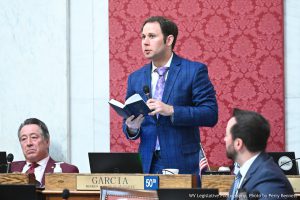 relocation expenses and mental health counseling for secondary victims. The amounts have not been changed in over 15 years.
relocation expenses and mental health counseling for secondary victims. The amounts have not been changed in over 15 years.
House Bill 4308 expands the persons who may apply on behalf of a child in foster care or is a subject of a civil abuse and neglect petition and authorizes law enforcement, guardians, and court and public agency personnel to disclose information and records for purpose of evaluation for Crime Victims’ Compensation Fund benefits.
House Bill 4311 sets felony penalties for voting more than once in an election, voting when knowingly not legal to do so, and rejecting votes or knowingly/willing accepts illegal votes.
House Bill 4312 allows first responders to vote by electronic absentee ballot in certain emergency circumstances.
House Bill 4324 updates collaborative pharmacy practice agreements.
House Bill 4329 updates the definition of an “interest person” in the West Virginia Small Estate Act. The bill states that an interested person would be any person or entity having a property right in or a claim against the estate of the decedent or property in a small estate.
House Bill 4331 allows for intergovernmental relations with urban mass transportation systems. These systems will qualify for federal funding through the US Department of Labor. The bill ensures that federal funding purposes and deductions are defined in code.
House Bill 4333 terminates the Board of Hearing-Aid Dealers and Fitters on June 30, 2023.
House Bill 4336 revises the methodology for property tax assessments by the Tax Commission to value property producing oil, natural gas, and natural gas liquids. The bill sponsor stated that the bill makes the tax structure constitutional. Opponents of the bill were concerned about the financial burden it could place on the counties, but the proponents argued that the counties are at risk of legal action due to the current tax structure.
House Bill 4340 allows the DHHR as a guardian to make an organ donation without a court order. It clarifies the duties of the medical examiner when procuring the organ. The bill requires the state medical examiner to cooperate with procurement organizations to maximize the opportunity to recover organs for donation. The bill authorizes the procurement organizations to conduct a test or examination which is reasonably necessary to evaluate the medical suitability of the body or part of its intended purpose. The bill authorizes the state’s chief medical examiner to enter into contracts and agreements with a procurement organization when necessary to facilitate the efficient and economical recovery of organ donations.
House Bill 4345 authorizes vehicle owners to utilize electric or mobile registration cards. Removed from the code is the requirement that the registration card is signed with ink.
 House Bill 4353 synchronizes local elections with statewide elections.
House Bill 4353 synchronizes local elections with statewide elections.
House Bill 4355 requires state institutions of higher education to disclose certain information about textbooks, digital courseware, and any charges associated with those.
House Bill 4369 updates the telepsychology compact to include graduate degree criteria for those participating in the psychology compact.
House Bill 4373 excludes fentanyl test strips from the definition of drug paraphernalia.
House Bill 4377 updates the involuntary hospitalization process. The bill updates the time limitations of commitment. The chief medical officer has 20 days to institute final commitment proceedings, or the patient shall be released. If the proceedings are not concluded 35 days from the filling of the Application for Involuntary Custody for Mental Health Examination, the patient shall be released. The bill also states that all law enforcement shall be involved in the commitment process, not just sheriffs. Transportation shall be provided to a commitment facility.
House Bill 4380 relates to the transportation of students and passengers for extracurricular activities. The bill increases the number of ten passenger vehicles that may be used for any school-sponsored activity and clarifies that buses shall be used to transport 18 or more passengers.
House Bill 4393 increases the tax on managed care if the organization receives a rate increase.
House Bill 4396 repeals the section of code relating to tolls for travel on WV toll roads and paid electronically through PAC cards.
House Bill 4406 establishes the WV Military Hall of Fame to honor veterans of WV who have distinguished themselves on the battlefield. Medals of valor listed in the bill include Medal of Honor, Distinguished Service Cross, Navy Cross, Air Force, Silver Star, Distinguished Flying Cross for Heroism, Bronze Star Medial with “V” Device, Air Medal with “V” Device, Commendation Medal with “V” Device, Achievement Medal with “V” Device and the Purple Heart.
House Bill 4408 extends the existing authority of the Director of Natural Resources to enter into third-party contracts for the financing, construction, and operation of recreational, lodging, and ancillary facilities to all West Virginia state parks, state forests, and state rail trails.
House Bill 4410 creates an equal allocation and apportionment of income for flow-through entities and C corporations.
House Bill 4418 establishes the Small Business Supplier Certification Assistance Pilot Program to develop and implement a certification process for disadvantaged and small business enterprises engaged in government contracting and bidding processes. The bill authorizes the Department of Economic Development to work with Marshall University to establish the pilot program.
House Bill 4419 allows candidate committees and caucus campaign committees to make contributions up to $75,000 to affiliated state party executive committees.
House Bill 4420 states that those diagnosed with diabetes mellitus requiring insulins shall not be allowed to operate a school bus.
House Bill 4426 repeals code sections relating to Provider Sponsored Networks.
House Bill 4430 defines “base salary and “overtime and other remuneration” for policemen’s and firemen’s pension and relief funds.
House Bill 4433 provides that the right to benefits is not subject to execution.
House Bill 4438 requires electronic voting systems to be independent and nonnetworked with no component connected to the internet.
House Bill 4450 removes the fee charged and deposited in the Combined Voter Registration and Driver’s Licensing Fund for each driver’s license issued by the DMV.
House Bill 4451 eliminates the requirement that qualified capital additions be located or installed at or within two miles of a preexisting facility.
House Bill 4461 consolidates all administrative fees collected by the Tax Division into the existing “Tax Administration Service Fund” and removes the $3 million cap on the fund. The bill provides that excess amounts in the Fund will not be converted into the General Revenue.
House Bill 4462 requires actuarial reports to be prepared and presented to the Legislature’s Joint Committee on Pensions and Retirement regarding active deferred retirement option plans event five years.
House Bill 4463 increases the compensation the members of the State Athletic Commission may receive during a fiscal year for their attendance and participation in public meetings of the commission.
House Bill 4466 requires the School Building Authority to approve local capital improvement bond finance plans before conducting bond levy elections and establish a time limit for project completion.
House Bill 4479 establishes the Coalfield Communities Grant Facilitation Commission. The bill set the membership and duties.
House Bill 4484 declares certain claims against agencies of the state to be moral obligations of the state and directs the Auditor to issue warrants for the payments.
House Bill 4488 ensures full, adequate funding for the operation of the Department of Environmental Protection’s Division of Mining and Reclamation by increasing certain fees for permitting actions.
House Bill 4489 requires county boards of education to post job openings to the State Board of Education’s Statewide Job Bank. The bill also adds that job openings for extracurricular activities shall also be posted to the Statewide Job Bank.
House Bill 4491 establishes a new legal and regulatory framework for drilling of injection wells and operation of facilities for the underground sequestration of injected carbon dioxide.
House Bill 4496 allows interest and earnings on federal COVID-19 relief moneys to be retained in the funds or accounts where those moneys are invested.
House Bill 4497 extends the jail per diem rate through July 1, 2023.
House Bill 4499 modifies and updates the outdated requirements of the procurement process and encourages earlier communications with and assistance from experts within Purchasing Division regarding the manner and process of procurement of commodities and services by spending units of the state.
House Bill 4502 establishes the BUILD WV Act to be administered by the Department of Economic Development.
House Bill 4511 amends the Unclaimed Property Act to make the process relating to the act more efficient.
House Bill 4517 repealed requirements to display video ratings.
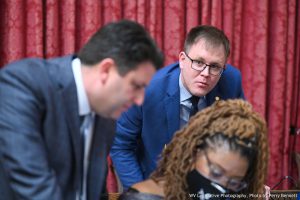 House Bill 4535 modifies the requirements for a driver’s license. The bill grants the DMV authority to restrict and revoke a driver’s license for certain reasons. The bill allows for a person to seek judicial review when a license is suspended, restricted, or revoked after a hearing with the Commissioner of the Division of Motor Vehicles. The bill removes the requirement to deny a license or instruction permit to any person under 18 who does not meet one or more certain academic-related requirements.
House Bill 4535 modifies the requirements for a driver’s license. The bill grants the DMV authority to restrict and revoke a driver’s license for certain reasons. The bill allows for a person to seek judicial review when a license is suspended, restricted, or revoked after a hearing with the Commissioner of the Division of Motor Vehicles. The bill removes the requirement to deny a license or instruction permit to any person under 18 who does not meet one or more certain academic-related requirements.
House Bill 4540 updates the retirement and pension benefits of the WV PERS, the Deputy Sheriff’s Retirement System, the Municipal Police, and Firefighters Retirement System, the State Police Death, Disability and Retirement Fund, the WV State Police Retirement Fund, the EMS Retirement System, the Teacher Retirement System, the Teachers’ Defined Contribution Retirement System, the Natural Resources Police Officer Retirement System, and the Judges’ Retirement Fun to comply with federal law.
House Bill 4560 affects 12 sections of the code. The bill provides additional protections for auto dealers in their transactions with manufacturers. It requires dealer agreements to establish legal requirements. It modifies obligations under warranties. Manufacturers cannot use the relationship with a dealer to find out information on other manufacturers. Performances standards for dealerships must be specific to local market circumstances, geographic characteristics, and traffic patterns. This is so manufacturers cannot impose one size fits all performance standards on dealerships.
House Bill 4562 clarifies the process of the suspension and dismissal of school personnel by the board and the appeals process. Once a fact-finding investigation alleges conduct that would jeopardize the health, safety, or welfare of students, the affected employee shall be suspended, placed on administrative leave, or reassigned to duties that do not involve direct interaction with pupils.
House Bill 4563 allows an auto mechanic to make an application for access to the DMV electronic temporary plate issuance system to access temporary plates to be used to operate or move a vehicle upon the highways and streets to diagnose functional and mechanical problems.
House Bill 4565 exempts temporary state employees and employees of the HEPC from automatic enrollment into the state’s 457(b) plan.
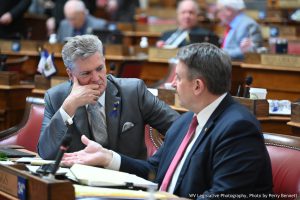 House Bill 4566 creates the Economic Enhancement Grant Fund for local governments for various economic development projects they have. The bill also authorizes WV Water Development Authority to make grants to cover all or portions of the costs of water, sewer, economic development, and tourism projects.
House Bill 4566 creates the Economic Enhancement Grant Fund for local governments for various economic development projects they have. The bill also authorizes WV Water Development Authority to make grants to cover all or portions of the costs of water, sewer, economic development, and tourism projects.
House Bill 4567 prohibits a municipality from imposing its business and occupation or privilege tax on any business activity or occupation when the basis of the tax is derived from products being shipped into or sold in the municipality.
House Bill 4568 eliminates the allocation of a portion of limited tax credits for certified rehabilitation projects with proposed tax credits of $500,000
House Bill 4570 establishes veterinarian telehealth.
House Bill 4571 includes electric-powered school buses in the county foundation allowance and increases the allowance by five percent for school bus systems manufactured in WV.
House Bill 4578 codifies the authorization of the superintendent of the State Police to oversee the administration and implementation of the State’s Handle with Care Program.
House Bill 4583 clarifies that a person who is incarcerated or in detention outside of the US may select a power of attorney to handle affairs while incarcerated or detained.
House Bill 4596 clarifies that home incarceration supervisors, state adult probation officers, state juvenile probation officers, and state parole officers are law enforcement officers who may carry a concealed firearm nationwide.
House Bill 4600 creates misdemeanor and felony offenses and penalties for child abuse by a person in a position of trust.
House Bill 4604 abolishes the Workforce Development Initiative Program advisory committee.
House Bill 4608 allows the State Fire Commission to create rules relating to establishing standards for probationary volunteer firefighters.
House Bill 4629 authorizes the Attorney General or the chief officer of the subject government agency to may issue a response to the potential claimant within 30 days of receipt of the notice to file suit to toll the statute of limitations during pre-suit negotiations for action against the state, afford a 90-day time to file suit absent pretrial negotiation, and dismiss claims absent suit filed within these 90 days.
House Bill 4631 establishes a bone marrow and peripheral blood stem donation awareness program. The bill directs the Bureau for Public Health to create a website to inform and promote donation awareness.
House Bill 4634 provides for an application method for a person with a valid occupational license in another state to be licensed in WV without additional requirements provided that the other state’s criteria for licensure are in line with WV’s criteria.
House Bill 4636 clarifies that municipal B & O taxes as well as municipal rates, fees, and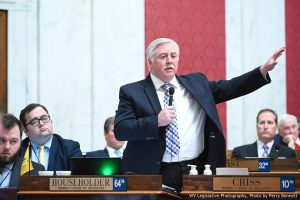 charges are owed to the municipality that is postmarked after the due date are late and subject to late fees or penalties.
charges are owed to the municipality that is postmarked after the due date are late and subject to late fees or penalties.
House Bill 4642 makes an exception to the prohibition of preventing county and district officers, teachers, and school officials from having a financial interest in contracts when a contract is for goods or supplies, has been put out for a competitive bid, and is awarded based upon lowest cost.
House Bill 4644 removes the requirement of an annual pesticide business license for persons applying products that are generally available through retail stores.
House Bill 4647 removes restrictions on apprenticeship applicants for Funeral Services. The bill also permits the use of alkaline hydrolysis. The bill also removes the requirement of continued education for funeral directors and embalmers.
House Bill 4649 transfers the operations of the WV CHIP Program to the Bureau for Medical Services and delegates policymaking authority from the current board of directors to the program director.
House Bill 4662 permits a Head State licensee to request the utilization of the WV for Clearance Access Registry and Employment Screening program.
House Bill 4667 prohibits county, municipality, city, or town restrictions on advanced air mobility aircraft and advanced air mobility systems.
House Bill 4668 establishes penalties for counterfeit or nonfunctional airbags.
House Bill 4675 authorities the operation of a low-speed autonomous delivery vehicle on certain streets and roads.
House Bill 4688 authorizes county firefighters to be members of the EMS Retirement System and provides for the transfer of assets of county firefighters. The bill requires the Consolidated Public Retirement Board to make the computations and terminates the liability of the PERS.
House Bill 4712 requires prompt enrollment in payment plans for costs, fines, forfeitures, restitution, or penalties in circuit court and magistrate court. The bill limits the maximum length of payment plans to three years in magistrate court and five years in circuit court.
House Bill 4743 requires security and surveillance video of medical cannabis organization facilities to be retained for 180 days unless otherwise required for investigative or litigation purposes.
House Bill 4756 creates pension funding programs to reduce the unfunded liability of policemen’s and firemen’s pension and relief funds.
House Bill 4758 allows the Special Reclamation Program to develop and maintain a database designed to track reclamation liabilities.
House Bill 4769 eliminates the requirement to send recommended decisions by certified mail.
House Bill 4773 adopts the FCC customer service and technical standards and requires certain cable providers to operate customer call centers to be in the state.
House Bill 4778 establishes the duties of financial institutions regarding multiple-fiduciary accounts and payments of multiple-fiduciary accounts.
House Bill 4779 permits banks the discretion to choose whether to receive deposits, in any amount, from other banks, saving banks, or savings and loan associations when arranging for the re-deposits of the county, municipal, and state funds.
House Bill 4785 provides that a judicial vacancy is filled by the Governor by appointment if the unexpired term is for less than three years.
House Bill 4787 creates the Highly Automated Motor Vehicle Act, permitting vehicles with automated driving systems to operate on West Virginia roadways and highways.
House Bill 4797 creates an EV Infrastructure Deployment Plan for West Virginia that describes how our state intends to use its share of NEVI Formula Program funds.
House Bill 4826 allows betting on e-sport events.
House Bill 4827 promotes the development of public use vertiports.
House Bill 4829 modifies the classification of certain cafeteria personnel.
House Bill 4847 allows the State Police to take over a missing person case when it is suspected that the person crossed county lines.
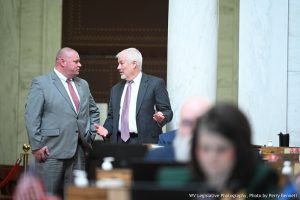 House Bill 4848 creates alcohol licenses for private bakeries, private cigar shops, private college sports stadiums, and private food trucks. The bill also permits private hotels and private resorts to be able to have minibars in rooms for guests 21 and over. The bill authorizes frozen wine slushes in wine growers to be sold. Merchandise may be sold by vendors selling alcohol.
House Bill 4848 creates alcohol licenses for private bakeries, private cigar shops, private college sports stadiums, and private food trucks. The bill also permits private hotels and private resorts to be able to have minibars in rooms for guests 21 and over. The bill authorizes frozen wine slushes in wine growers to be sold. Merchandise may be sold by vendors selling alcohol.

